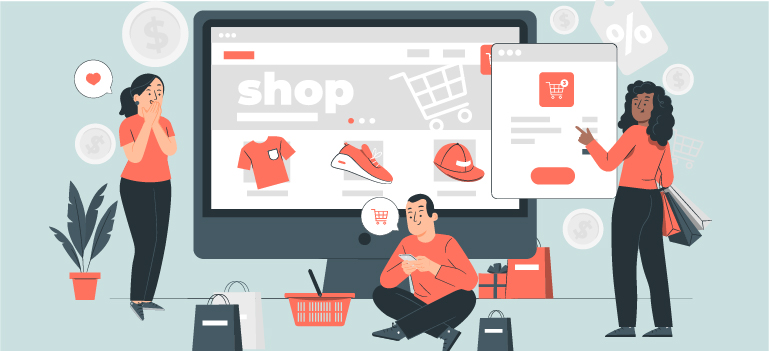E-commerce is a rapidly growing sector, expected to see over 8 trillion sales globally by 2026.
With such bountiful rewards, it’s no surprise that scammers and hackers jump on the opportunity to steal funds and data from shoppers.
But how do these cybercriminals scam their e-commerce users? In this article, we’ll discuss the risks you might face while shopping online and how you can mitigate them.
6 Prominent Risks to be Aware of When Online Shopping
1. Viruses
Hackers take advantage of the situation as online shopping integrates into our normal way of life. Not all the links and downloads online are safe, as many contain malware.
Next time you’re browsing e-commerce stores, consider:
- Does the website look well-designed and legitimate?
- Are there any unnecessary downloads?
- Is the domain name spammy or posing as another brand?
- Are there too many pop-ups and suspicious ads?
It’s also essential to install antivirus software. Run regular scans to make sure you haven’t picked up any unwanted passengers while you’re surfing the web.
2. Adware
The most commonly reported form of malware is adware, making up 42% of malware found in 2021. This sneaky virus can cause significant damage to users, but its most dangerous trait is the way it can blend into your desktop.
Adware causes advertisements to be spammed on your desktop, websites, or apps. The issue is that many of the items and links in the ads lead to fake websites and corrupted downloads.
If you notice that you’re receiving more ads than usual, avoid clicking on links and run an antivirus scan. Often the most obvious sign is an ad showing up where it’s not supposed to be.
3. Unencrypted Wi-Fi
Heading into sales seasons, many of us do our shopping on the go. Whether in coffee shops, restaurants, or hotels, the public Wi-Fi you’re connected to might be unsafe. But how can you even tell if the connection is secure?
Luckily, you don’t have to anymore. You can avoid your data being stolen with the use of a Virtual Private Network (VPN). Plus, if you catch a sale like VPN Cyber Monday, you can snap up a yearly subscription for a reduced cost.
When free Wi-Fi is unencrypted, hackers can quite easily snoop on the users connected to it. To mitigate snooping and possible data theft, create your own encrypted tunnel on any Wi-Fi Network with a VPN.
4. Payment data theft
It’s not only the consumers that are targeted by hackers. E-commerce stores often host malware on their websites without realizing it. This malicious code collects the payment data of all customers who enter their credit cards on the site.
This is still an ongoing issue in many Adobe Commerce and Magento e-commerce stores. This year, Adobe released patches for the security vulnerability in Adobe Commerce stores that would steal consumers’ payment data.
Although the patch was released almost a year ago, only one-third of Magento and Commerce stores are reported to have installed it. This means that there are countless e-commerce stores that are still vulnerable to this security flaw.
5. Fraudulent E-Commerce Stores
It’s one thing when a legitimate store gets hacked but it’s another when you stumble upon a fake store that never existed in the first place. Sometimes it is difficult to distinguish a legitimate site from a fake one.
Creating fake stores is a common sales scam technique. Most of these imitate real, established brands to trick their victims.
There are a few tell-tale signs of a fake store to watch out for:
- Investigate the URL – “versace.com” should definitely not be “ver5ace.com”.
- Is it a “https” or an “http”? HTTPS guarantees a higher level of security – the “S” is a Secure Sockets Layer (SSL).
- Trust your browser – if it says it’s unsafe, do not proceed.
- Check the website’s history on Google’s Transparency Report.
Skilled hackers know to dodge these warning signs, so a scam website can be tricky to spot. Ultimately, trust websites with safe payment methods like PayPal and avoid handing over your debit card or bank information.
6. Fake reviews
You might wonder why we haven’t mentioned checking a website’s reviews yet. The truth is reviews have become increasingly untrustworthy. Fraudulent companies and scammers will often hire writers to create fake 5-star reviews.
If you’re investigating a product or a website’s authenticity via reviews, pay attention to:
- How biased the writer sounds.
- If the compliments are insincere or unrealistic.
- Poor grammar and spelling issues.
- Lack of detail.
- If there are any bad reviews hidden at the bottom.
In the end, if the reviews sound fishy and fake, trust your gut and avoid the website entirely.
Conclusion
As millions flock to the internet every day to scoop up holiday deals or discounted items, cybercriminals are lurking around every corner.
Keep in mind the main risks outlined in this article and how to mitigate them. In doing so, you can feel more secure shopping online – securely.
Leo Corado
Tags: E-Commerce, Online Shopping, VPN


